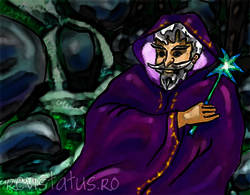The box of words
A story by Alina Nelega, translated by Anca Maria Pop Lupu, illustrated by George Moldovan.
Interpreted by Stuart Ferguson.

Once upon a time there was a place words sprang from. They came randomly, sometimes hardly dripping, other times flooding, but nevertheless they sprang unceasingly. There were neither sentences longer than two or three words, nor phrases, nor stories, but everywhere there were only words: they buzzed around unexpectedly and you could bump into them everywhere, only that they were meaningless. They were so disorderly that you couldnlt understand anything.
But one day, Fantezissimus, a good wizard, but kind of a trickster, came across the words spring. He liked to make all sorts of spells, although some of them were rather sassy, but as I have mentioned before, he was basically a good wizard.
Fantezissimus liked The Spring of Meaningless words. He played with them for a while, grouped them in rows of ten, then rows of one hundred, he made word carpets and word houses, where the fire was burning into the fireplace and smoke came out of the chimney in the form of words. This took a while, but eventually Fantezissimus became bored with it.

Then he thought about casting a more complicated spell that would last forever and that would never bore anybody. He started with the study of words and he observed that they were not alike. He noticed that there were very conceited words that named everything around us. There were also words that brought about other words which followed them obediently, the same way cubs follow their mothers. There were naughty words that linked the other words, and also limping words, grumpy words, big and small words, good and bad words, all sorts of words. They were like the bees in their hive. And they even looked like bees, because they were flying around, stinging pretty badly, and sometimes it would happen that they dripped honey while playing.

After Fantezissimus realized how many types of words existed he started organizing them. He took some small special boxes and built all sorts of objects made of words, which he then placed inside the boxes for safekeeping. It sometimes took him an enormous amount of time to fill the boxes; other times he could do it very quickly. He them places the boxes onto some big shelves, which he sent into the world in order to offer the people a present.
And the people called these presents “books”. Books are like boxes; inside the books there are many objects made of words, sitting there nicely, well-organized by Fantezissimus and when you open them you can find unimaginable things: animals and rivers, big ships, palaces, fairies and delicious cookies recipes, but also more entangles things that are difficult to repeat, like Maths and Physics lessons.
Certain words from certain boxes start running or jumping inside your home as soon as you open the book – sorry, not the book, but Fantezissimusl box. Then they return and quietly wait for somebody else to open the box. Sometimes they can wait for months, years, or centuries. They sometimes stay young but they can also grow old and when you open the box again the are not so nimble any more, they squeak and they need repairing.

This is why in such cases other words come to assist them, and these are younger, newer words that Fantezissimus sends to their rescue. This is possible because the words spring functions unceasingly, and the wizard of words, Fantezissimus has settled there and keeps making these magic boxes even nowadays.



